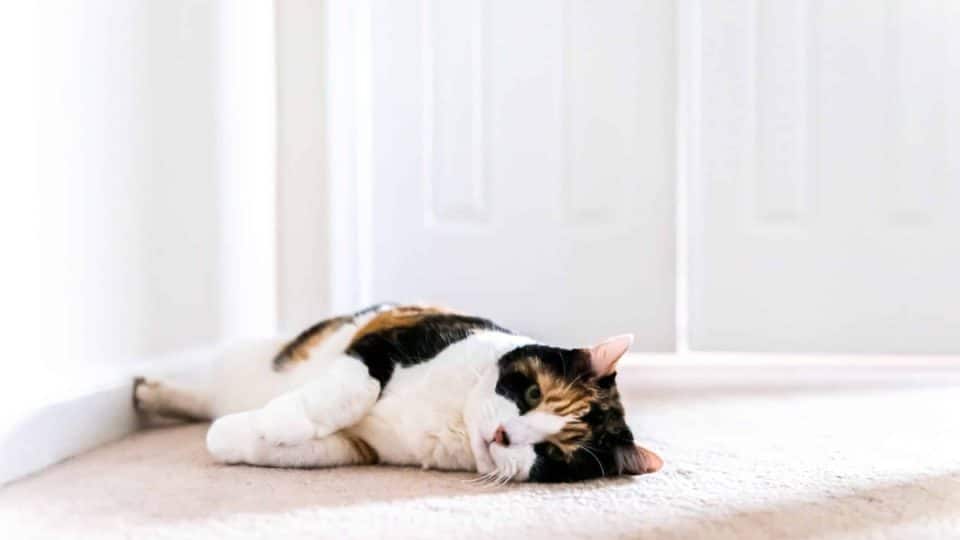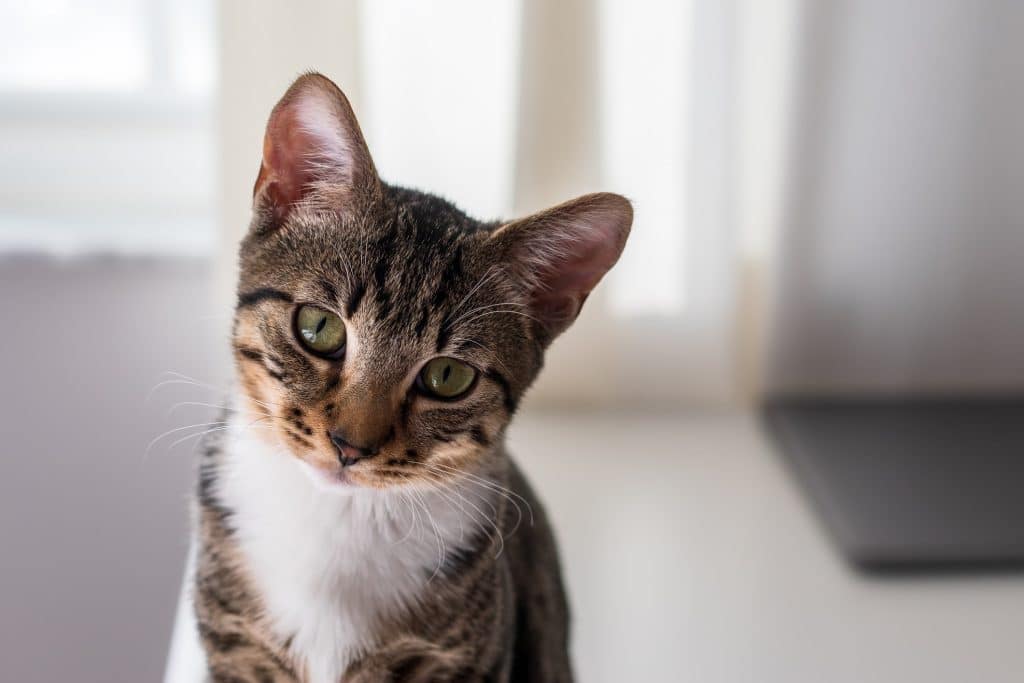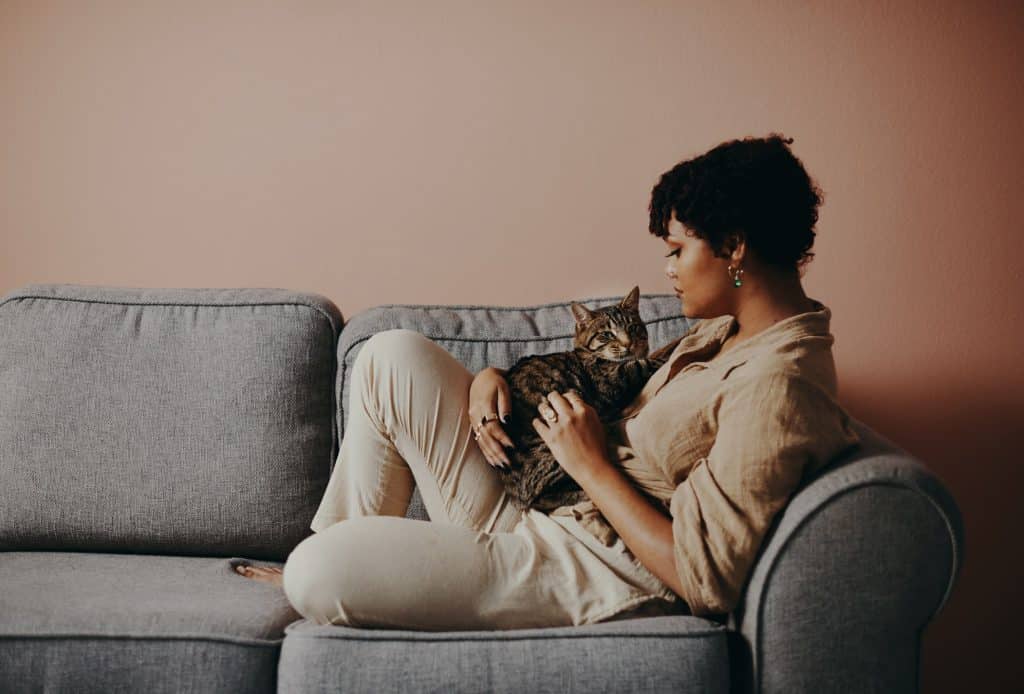Cats might have a reputation as solitary animals, but they’re still social animals. In fact, there’s more reason not to leave your kitten alone during the early stages of development.
On average, cats can be left alone for up to 8 hours. Meanwhile, kittens less than 4 months old shouldn’t be left alone for more than 4 hours. If you need to leave your cat alone for up to 24 hours, ensure their meal and mental needs are met through automatic feeders, toys, or a cat drop-in.

Molly DeVoss, Certified Feline Training & Behavior Specialist and founder of Cat Behavior Solutions, shares, “Adult cats [can be left alone for long periods of time] only if you can provide fresh meals in meal timers at regular intervals and plenty of enrichment and entertainment.”
However, other factors, including your cat’s age and personality, determine how long you can leave your cat alone. We’ll explain how to tell if your cat is happy spending time alone and how to plan their care when you’re on vacation.
Guideline for Leaving Cats and Kittens By Themselves
Cats enjoy independence, but that doesn’t mean they can’t experience loneliness and behavioral changes if they are alone for extended periods of time. And when there are enough resources around, domestic cats prefer to form social groups. For homes with multiple cats, cleanliness will likely be the most important factor for a drop-in sitter or reduced time alone.
Cats with no medical or behavioral issues can be left alone
- Up to 8 hours: Cats of all ages will be comfortable with 8 hours of alone time as long as you leave them with enrichment activities and safe spaces to sleep.
- Up to 12 hours (overnight): Adult cats, not including seniors, may be left overnight if they have an automatic feeder, scratch posts, and an electronic litter changer.
- Up to 24 hours: This is the limit for most adult cats (not including seniors) before they start to feel lonely or anxious.
Not recommended: Over 24 hours. Cats left alone for longer than 24 to 72 hours may start to be concerned with their ability to survive and become anxious. In these scenarios, booking a cat sitter to stay for more than 30 minutes is important. Make it clear to your sitter that you want your cat to get some socialization, even if it means sitting from a distance.
Senior cats or cats with behavior or medical issues will need to stick to their routines. While they may be okay with being left alone during your work day, longer vacation trips can cause them stress. For older cats and cats with medical concerns, you’ll want to book twice-a-day drop-ins to monitor their safety and well-being.

iStock/Alexander Lyakhovskiy
Risks of Overextended Alone Time
Dr. Michael Fleck, a veterinarian and co-host of The Pet Buzz radio show, says mature cats left alone will have significant behavioral changes when left alone for too long. Symptoms of loneliness in a cat may look like:
- Destructive behavior. From scratching the sofa to damaging door frames, your cat might be trying to de-stress by leaving calming scent signals.
- Excessive meowing. After leaving your cat for an extended period, you might notice they’re more vocal than normal once you return home.
- Peeing outside the litter box. Cats love to be clean, so if your cat’s litter box isn’t cleaned while you’re away, they may start to poop or pee outside the litter box.
- Loneliness or depression. Signs of depression can include loss of appetite, being more subdued than normal, over-grooming, hiding, or self-mutilating.
- Anxiety. Anxiety can look different for each cat but might include hiding, crying, or nervousness. Cats with anxiety might become more clingy once you’re home. Research has also found that when separated from their owners, cats often spend more time moving around than normal.
- Aggression. Your cat’s destructive behavior may extend to aggressive behaviors towards humans and other cats.
Long periods of separation can be very upsetting for cats, and you may see a range of behavioral changes. These may be more pronounced in older cats who already have a set routine. Try to decrease the amount of time your cat is left alone to see if the behaviors improve. If there is no progress, speak to your vet to rule out pain or illness.
Don’t rely on robots: Automatic feeders will run out of food, and self-cleaning litter trays will stop cleaning. Your home may become very messy as your cat tries to survive.
Why Kittens Need More Socialization Than Alone Time
Kittens have specific developmental periods during which they’d benefit from less alone time than adult cats. DeVoss recommends that most kittens be left for no longer than eight hours. “It’s during these formative months that your kitten is bonding with you, learning about you, the environment, and routine in the home,” she says. “It’s the time you want to be conditioning them for adulthood.”
Research supports this, noting that social play starts at 4 weeks and declines at 12 to 14 weeks. Around 18 weeks of age, kittens start to play with objects, which means creating a safe space for them when you’re not around. A drop-in cat sitter who is tasked with playing and scooping litter while you are at work can help your kitten’s social development.

iStock/Delmaine Donson
Checklist for Leaving Your Cat Alone
Before leaving your cat at home alone, Quandt recommends pet parents to check for all safety issues, such as:
- Putting away or taping down electric cords
- Removing any toxic houseplants
- Removing or securing breakable items
- Double-checking that window screens and doors are latched completely
- Covering up any potential holes or hiding spots they can get stuck in
“Pet cameras may be the single best thing you can get because then you can actually see your cat,” Quandt adds. “Point them at places where your cat likes to hang out, and possibly at the feeding area.”
If you can, set up your kitten-proof room in the bathroom and laundry room. These rooms are a good choice because they’re usually small and have easy-to-clean floors. To help your kitty move around a little more, you can set up the litter box in one corner and food and water bowls in another part of the room.
Helpful Toys, Tools, and Automated Robots for When You’re Away
Engaging toys & games
Leaving suitable toys can help keep your cat mentally and physically active while you’re out. “Motion-sensitive toys can help because they come to life when your cat gets close to them,” explains Certified Feline Training and Behavior Specialist Stephen Quandt.
DeVoss also recommends leaving treat puzzles out to simulate their hunting instincts and help prevent boredom. For those with a porch or balcony access, DeVoss also recommends setting up bird feeders so your cat has a front-row seat on their comfy cat perch for quality avian action.
Anxiety-reducing environmental tools
DeVoss suggests leaving on some TV or music for your cat to listen to, and there are lots of options to choose from, including Cat TV on YouTube, or some calming classical music.
Cat calming pheromone diffusers like Feliway can help, but results will vary. Quandt mentions that research shows these may not be effective for all cats.
Automatic & electronic feeders
Automatic feeders can help make sure your cat doesn’t miss their regular meals. Quandt recommends making sure you familiarize your cat with how to use the feeder before you leave them alone.
Additionally, Quandt recommends investing in water bowls you can pre-fill. Stagnant water bowls start to get nasty after a day or two.
Robotic litter boxes
A dirty litter box can upset your cat. Some cats need their boxes scooped more frequently than 8 hour intervals to be happy. Any longer and you’re pushing their limit, says Quandt. A robotic cat litter box is a much better option for busy pet parents. Again make sure your cat is familiar with using an automated litter box before you leave them alone with one. If a robotic litter box is out of your budget, consider multiple litter boxes.
Is It Worth Getting a Cat Sitter?
For young cats and kittens, hiring a cat sitter is a great way to fulfill your cat’s needs while you’re in the office. Adult cats, with the exception of seniors and cats with separation anxiety, are likely to be content for up to 8 hours. “It’s absolutely okay to leave cats alone for short periods,” says DeVoss. “Even the most social cats need some moments by themselves.” After all, to keep our cats supplied with the food and treats they deserve, many of us have to go to work!
But another benefit of having a regular cat sitter? Building bonds that make you and your cat feel more secure when you’re apart. A trusted cat sitter might even become one of your cat’s favorite people!
As Quandt reiterates: “Being a responsible pet parent to a cat means taking their cat’s physical and emotional health seriously and treating them like a family member whom you love. If you have to leave for a few nights, get a cat sitter.” It’s the kind of responsible, and loving thing a pet parent would do.



-1715997981-q80.webp)